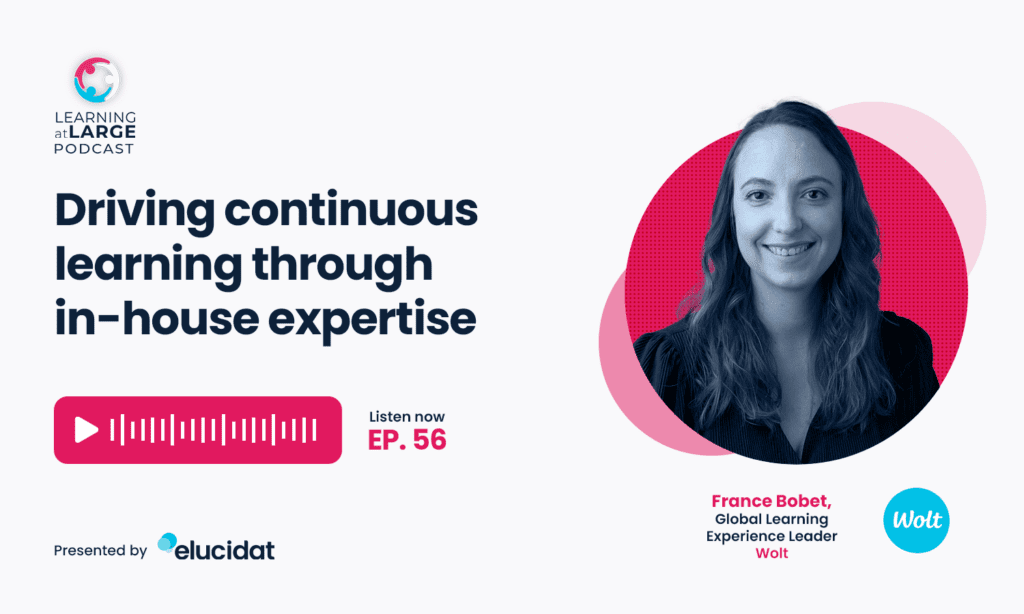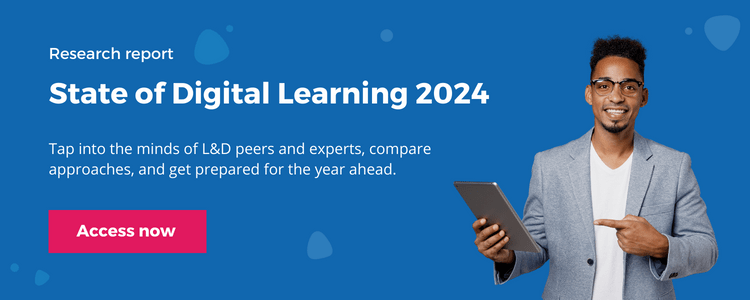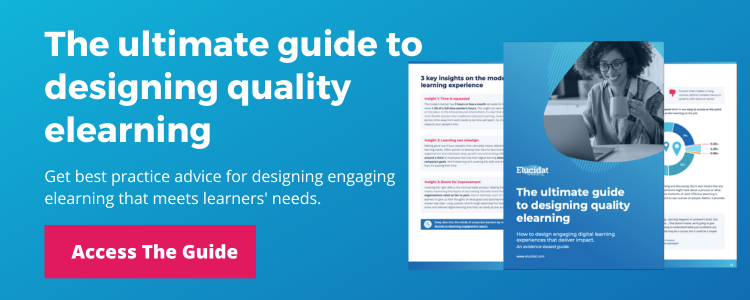Using In-House Expertise: France Bobet
Continuous learning is essential for individuals and organizations to adapt, grow, and thrive. Hear how France Bobet, Global Learning Experience Leader at Finnish tech company Wolt, empowers in-house experts to create impactful learning. France shares insights into their journey towards decentralized learning and a collaborative model, whilst maintaining quality control and scaling the model.

Top tips for driving continuous learning
Don’t have time to listen now? Here are some top tips from France:
- Start small and build a solid foundation: Start with deliberate, small steps, concentrating on specific teams to establish a culture of ground-up learning
- Collaborate closely with in-house experts: Engage with subject matter experts and trainers in your organization to offer varied learning approaches and nurture career growth.
- Focus on quality assurance while scaling: Give priority to quality assurance when expanding the use of in-house experts for effective learning experiences.
- Recognize and reward expertise: Recognize and incentivize top trainers in your organization to sustain engagement and drive.
1. Start small and build foundations
France Bobet emphasizes the importance of taking small steps when embarking on the journey to unlock in-house expertise. Their focus started with their support teams, recognizing that they needed consistency and structure, yet needed to be able to keep up with changes. Shifting to a model where employees could be in the driving seat helped make this happen. From there, they could grow their collaborative, empowered learning model.
“We believe that in order to keep up with change, we need to look at learning in a more decentralized way. Meaning that we rely on our people… They are in the driver’s seat. We started looking at our support teams… They started to see that we needed a bit more consistency, structure, but the goal was that we need to keep making changes.”
2. Collaborate closely with in-house experts
To harness the knowledge and expertise of in-house teams, collaboration is key. Wolt’s approach involves partnering with subject matter experts and trainers within the organization. These experts help shape the learning journey and together they could choose the right tools to create the materials.
Collaboration with in-house experts allows organizations to tailor learning strategies to the specific needs of their workforce.
“They could help us select what are the learning tools that would make the most sense for them and that they would feel at ease with. We wanted something that they are not gonna spend six weeks learning. It had to be something that they can really grasp quite quickly.”
3. Focus on quality assurance while scaling
While scaling up the use of in-house experts, Wolt maintains a strong focus on quality assurance. Initially, the quality might not have been perfect, but the emphasis is on progress. This dual approach of scaling and quality assurance ensures that the learning experiences remain impactful.
Continuous learning initiatives must prioritize quality assurance. By doing so, organizations provide their employees with high-quality learning experiences that contribute to long-term career development.
“We make sure we have quality assurance. Because of our eye for growth, we knew that at the beginning when we started, the quality might not have been there, but we were all about progress. And it was more about that initially. And now I think we’re trying to do a bit of both so that we’re still scaling, but we’re looking a bit more at the quality side of things. So how can we ensure the experience is good for our learners as we keep scaling.”
4. Recognize and reward expertise
Wolt recognizes the contributions of its top trainers and looks for ways to reward them. Acknowledging the experts within the organization and providing support for those who may be struggling is essential for sustaining a culture of continuous learning. It keeps employees engaged and motivated to contribute to the organization’s learning journey.
“We’re trying to see how we can reward our top trainers to some extent. How can they be recognized within the organization for all the great work they are doing and how can we support the one that struggle as well.”
A quick recap
Unlocking in-house expertise is a journey toward empowered, continuous learning. France Bobet suggests these four strategies to drive continuous learning:
- Start small, build foundations: Begin with small steps to foster continuous learning.
- Collaborate with Experts: Partner with in-house experts for tailored learning.
- Quality Assurance When Scaling: Ensure quality while expanding expert-led learning.
- Reward Expertise: Recognize and motivate top trainers.
These strategies leverage in-house knowledge for a dynamic learning environment.
Want to find out more about driving continuous learning through in-house expertise? Check out the full podcast.
About France
France has over 10 years experience in Human Resources Development setting her up to work within Global Learning and Development and Change Management. France currently works as a People Development Lead, building an engaging, continuous and humble learning culture at Wolt.
You can find out more and get connected with France on LinkedIn.
Learn more from like-minded learning experts
Interested to hear more from France as well as other learning experts and your L&D peers? The State of Digital Learning Report is the place where you can tap into the minds of your L&D peers and learning experts, compare approaches, and get prepared for the year ahead.

